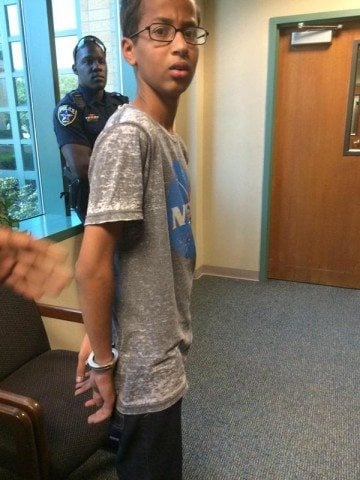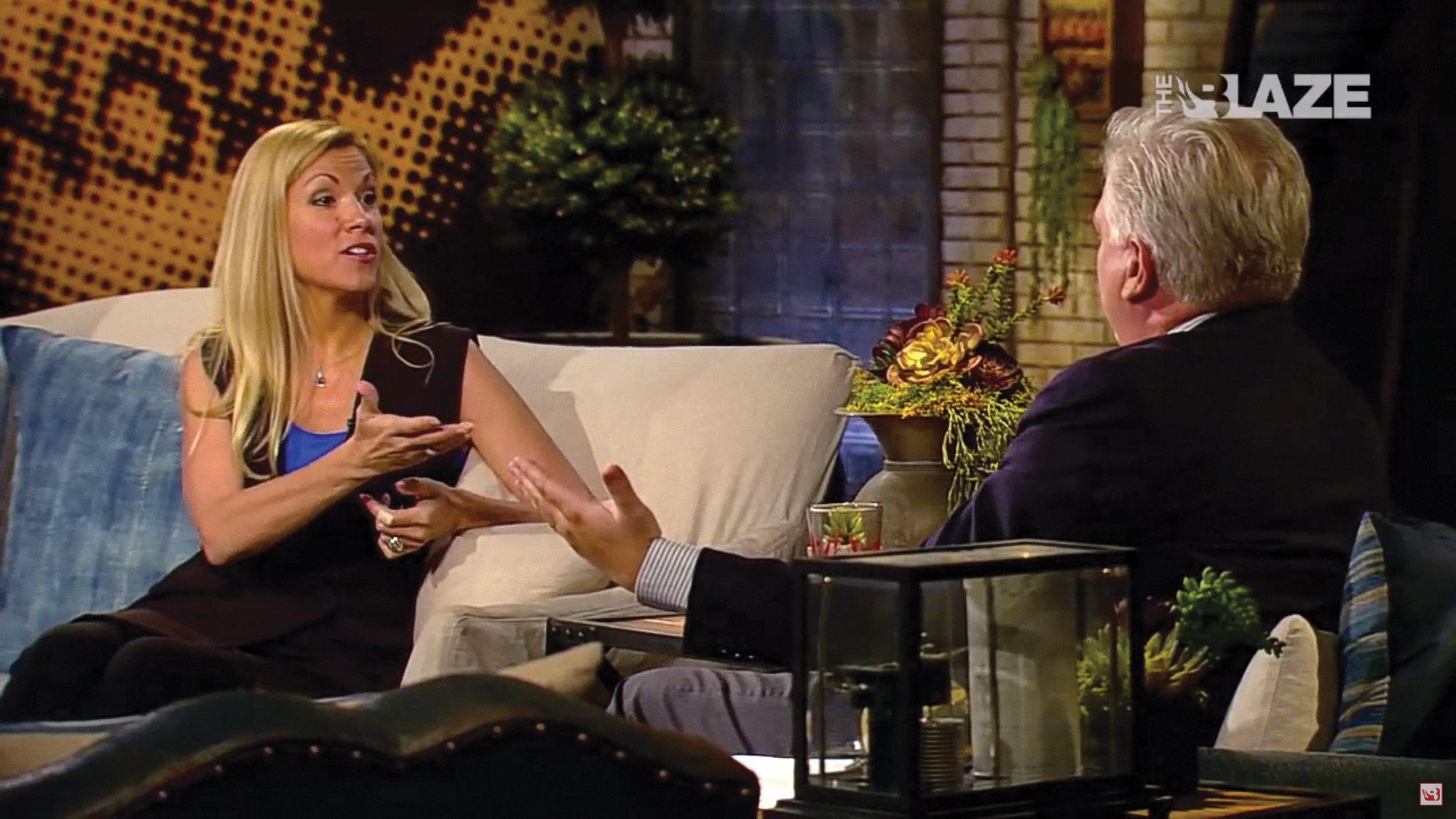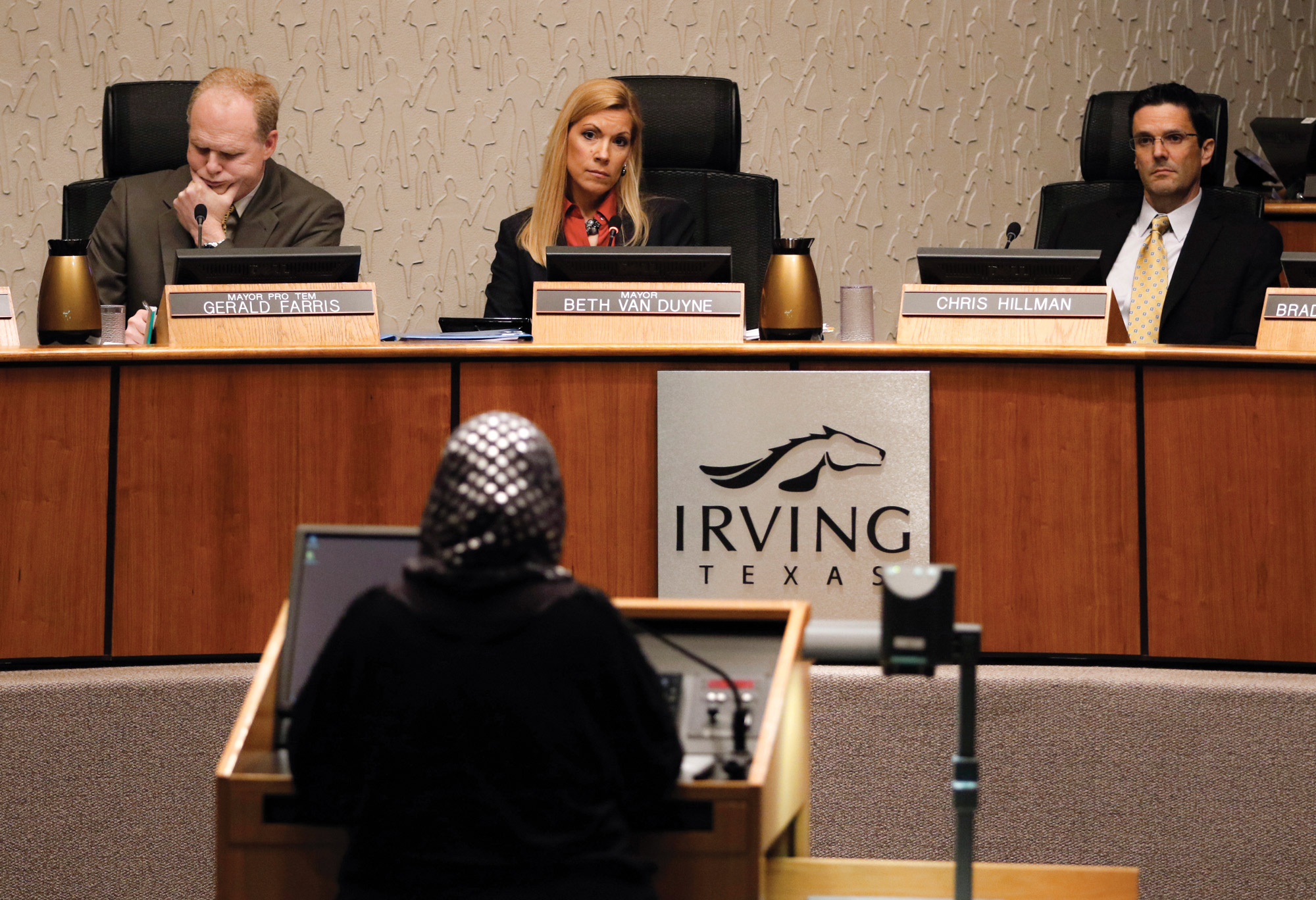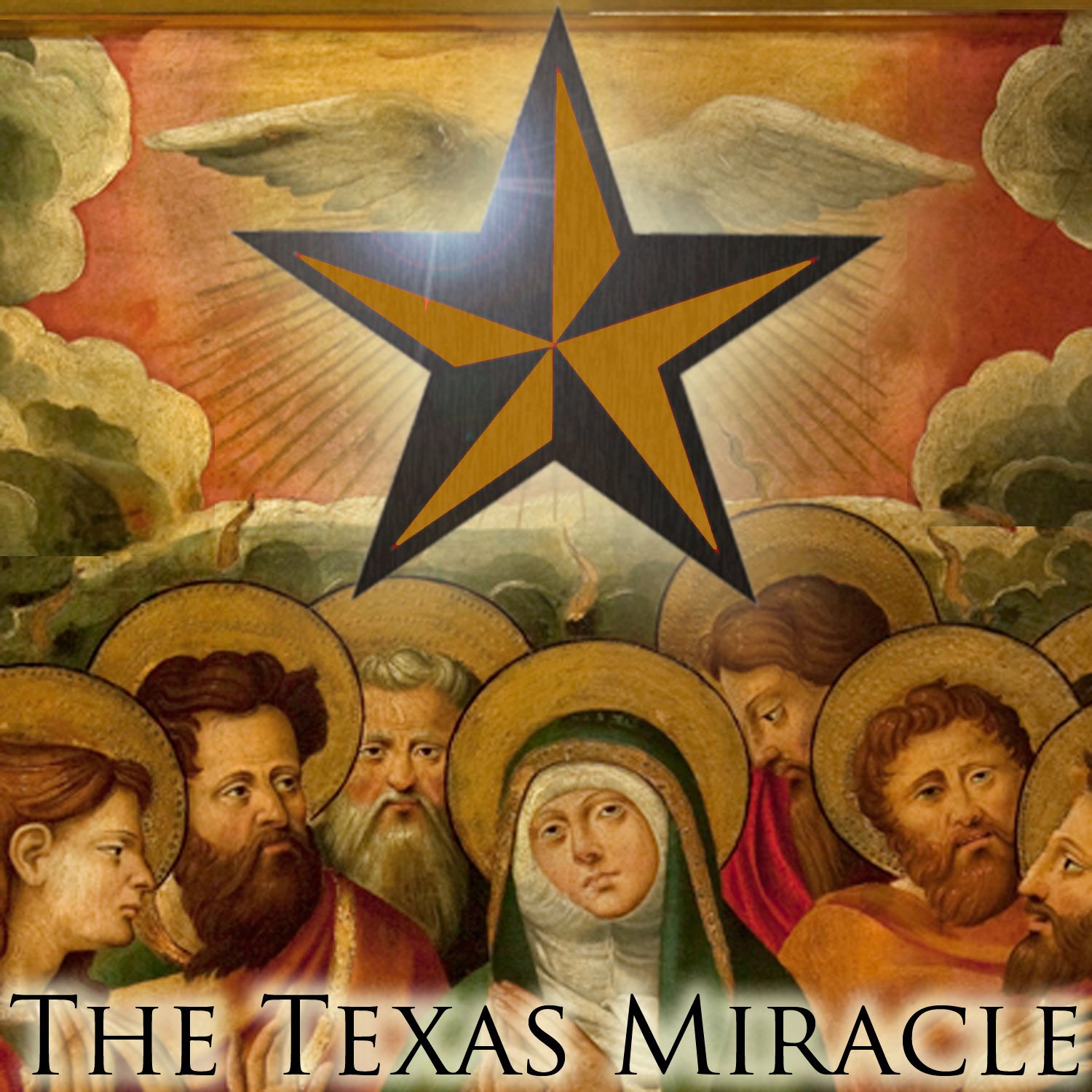Glenn Beck turns to Beth Van Duyne, the mayor of Irving, his face lit with his signature mixture of excitement and manic alarm. “Let me just propose a theory,” he says.

Just a week earlier, Ahmed Mohamed, a local teen who became known as the “Clock Boy,” had been arrested for taking a homemade ticker to his middle school. Mohamed’s bad day quickly became a global media phenomenon, one of the most widely traveled stories to emerge from Texas in 2015, and Beck, whose personal TV network, The Blaze, is based in Dallas, was starting to connect the dots in the cluttered blackboard of his mind.
“For some reason, Irving is important to the Islamists,” he posits. It “could be as simple as the progressives trying to turn Texas blue.” Regardless of the precise reasons, the firestorm that has befallen the city is retribution, Beck tells Van Duyne. “You pissed them off. And now this is a dog whistle,” a call to marshal the forces of jihad against North Texas. War is coming.
Van Duyne doesn’t embrace Beck’s mounting panic, but she doesn’t challenge his theory, either. “It’s nothing that I really want to have to face if that’s true,” she tells Beck. “I would hate to think that that’s true.”
Next to Van Duyne on Beck’s couch is Jim Hanson, an analyst for a fringe group that trafficks in anti-Muslim conspiracy theories. He’s willing to entertain Beck’s theory. “It was a staged event,” he says.

“I don’t think it’s a coincidence. The last step is total confrontation,” Beck says. “Any doubt in your mind this is the final throes of weakening us to the point where we don’t ask any questions to be ready for final confrontation, total confrontation?” Hanson agrees: “We must lay down and submit.” Van Duyne sits between them, silent and smiling.
America had a strange 2015. The year got off to a mundane start, but by the end the nation was face-to-face with its worst self. You could say the same about Irving, the nation’s 93rd-largest city, an otherwise unremarkable cluster of suburbs and business parks to the northwest of Dallas, one of the many planets in the solar system of the Metroplex. At the start of the year, Irving was probably most famous as the former home of the Dallas Cowboys.
“For some reason, Irving is important to the Islamists. [It] could be as simple as the progressives trying to turn Texas blue.”
The city’s newfound reputation made it a magnet for anti-Muslim activists. In the weeks before Christmas, heavily armed men protested outside of the Islamic Center of Irving, and a Texas chapter of the Ku Klux Klan lurked, pledging to make the city the host of its next march. If you watched the news in 2015, there’s a pretty good chance you heard about some part of Irving’s bad year. What happened?
The trouble started with the right-wing outlet Breitbart, as it so often does. January had been a strange month in North Texas: The Charlie Hebdo attacks in Paris had spooked people, and there were protests and outbursts of anti-Islamic sentiment in Garland and at the Legislature. There had been chatter on social media about the activities of Dallas-area mosques. Into the breach jumped Breitbart’s intrepid crew of investigative journalists: “An Islamic Tribunal using Sharia law in Texas has been confirmed by Breitbart,” the website reported on January 27. The item immediately went viral, shared and re-shared all over the Metroplex and beyond.
In the last few decades, the way media works in places like Irving has changed significantly. Once upon a time, the area’s biggest newspaper, the Dallas Morning News, had multiple reporters whose primary job was to cover Irving, and if you were an Irving resident, you were dependent on what’s now referred to as the “mainstream media” to learn about your city and neighborhood. By 2015, the Morning News had one full-time Irving reporter. Now, it has zero.
Through the media’s lens, Irving, one of the most diverse cities in the United States, became known as a city with a problem, the problem of bigotry.
The problem is that Breitbart is almost indescribably bad at basic journalism — the transmission of accurate information. With the Sharia tribunal story, Breitbart’s scribe had uncovered a group of Islamic jurists in Dallas who offer their services in nonbinding dispute resolution, in a manner similar to mediation services provided by Jewish Rabbinical courts and Christian mediators. The tribunal’s rulings are voluntary — participants who aren’t happy with its decisions could seek further judgments from actual courts — though Breitbart’s story strongly implied that the “voluntary” nature of the service was a lie, ominously noting that the tribunal member Breitbart talked to “would not discuss what happens to someone who did not follow their rulings.” The reporter had presumably “confirmed” the Islamic tribunal’s existence by going to its website: The group had been around since 2012, and was no secret.
But the story blew up and Breitbart kept it rolling. The day after, Pamela Geller, a fiery activist the Southern Poverty Law Center calls the “anti-Muslim movement’s most visible and flamboyant figurehead,” penned a column for Breitbart on the danger of the Texas tribunal: “This is how it starts,” she wrote: The introduction of Sharia law, in any form, ended with cultural annihilation and submission. Geller’s column erupting into full-blown panic.
The frenzy reached Mayor Van Duyne, who posted a full-throated statement on her Facebook page, seemingly without making any attempt to check out for herself the reality behind the story. “If it is determined that there are violations of basic rights occurring, I will not stand idle and will fight with every fiber of my being against this action,” she wrote. “Our nation cannot be so overly sensitive in defending other cultures that we stop protecting our own.”
The mayor’s statement — which would be followed by more pointed ones over the coming months — grabbed the attention of Avi Selk, the Dallas Morning News’ Irving reporter. It was odd, he and his editors thought, that the mayor “was sort of giving these half-statements that would, intentionally or not, lead people to believe there was some kind of Sharia court operating, when we knew that to not be true,” Selk said. (Van Duyne did not respond to Observer requests for an interview.)
Van Duyne faced criticism and admonitions to be careful from the newspaper’s editorial board and other prominent voices in the Metroplex. But in the closed feedback loop between Breitbart readers and conservative activists on social media, she was heaped with praise for standing up for American values. She became a regular on the Metroplex’s tea party circuit.
She froze out the Morning News and other so-called traditional media. When Selk wrote a short profile of the mayor at the behest of an editor, asking questions about her family and personal life, Van Duyne took offense. For much of the last year, she’s told conservative groups that the paper was attempting to intentionally destroy her. She’s included Selk’s picture in her slideshows and presentations, as if to say “Here is the enemy.” She’s retweeted criticism of Selk implying he has a sexual interest in her.
Things came to a head in March. At the Legislature, tea party lawmakers were pushing House Bill 562, which would have declared the supremacy of American laws over foreign ones, a supremacy already established in American law. Around the Capitol, it was widely known as an “anti-Sharia” bill. It’s unusual for city councils to weigh in on legislation that doesn’t affect them directly, but Van Duyne thought it important to make an exception, and she asked the Irving City Council to pass a resolution in support of the bill.
The meeting turned the council chambers into a circus. A variety of Muslim and non-Muslim community members stood up to condemn the resolution, but so did a Muslim man who told the City Council, in faltering English, that ISIS was a Zionist plot. It was nearly a half-hour before an Irving resident rose in support of the measure, a man with an American flag shirt and mutton-chop sideburns. Another man, a candidate for City Council, rose to read the first stanzas of Lee Greenwood’s “God Bless the USA.”
The resolution passed by a 5-4 vote, and Van Duyne was rewarded with more attention from right-wing media, including an interview with Dana Loesch, a host on Glenn Beck’s network. “We were not targeting them. I’d argue that they were targeting us,” Van Duyne told Loesch about Irving’s Muslims.
The mayor had challenged the Muslim community to loudly proclaim that they supported Van Duyne’s resolution, to reassure Irving’s frightened residents. Van Duyne treated their failure to do so as a betrayal that raised troubling questions about their commitment to American values. Van Duyne told Loesch that she asked Irving Muslims if they support American laws. “We never heard back from them,” she said. Her rhetoric was becoming sinister.

The strange thing about Irving’s acquired reputation as a symbol of white reaction and Texan xenophobia is that Irving seems spectacularly unsuited to either: It’s one of America’s most diverse cities, and is home to what has been repeatedly cited as the nation’s most diverse zip code (75038), which stretches across the north of the city. In 1980, Irving was 93 percent white. Today, it’s just 31 percent white. Hispanics make up 41 percent of the city, African Americans 12 percent and Asians 14 percent. More than one-third of its residents are foreign born.
Irving looks a lot like what the New Texas is supposed to be: culturally vibrant, economically dynamic, and with great food to boot. Belt Line Road, which runs north to south, is home to a stunning variety of cuisines, a place you can find Peruvian, Pakistani, Puerto Rican, Nepalese and Cajun restaurants within walking distance of each other, plus African Village, a restaurant owned by a Cameroonian-American woman that boasts of serving the “best goat meat in town.”
But the complexion and politics of the city government has remained white and conservative. Until 2010, all eight members of the City Council were elected at large, effectively ensuring that white voters, who have a much higher turnout in local elections, picked the city’s leaders. A local activist sued, claiming the citywide election system was discriminatory, and a court ordered Irving to use single-member districts, hoping that would increase minority representation. But the new council is almost as white as the old one. Of its eight members, seven are white men and one is an African-American man.
Then there’s Van Duyne, an immigrant too — from upstate New York. Her stand against Sharia put her in good stead with the clique that exercises the most political power in her city, but it also served as a sort of land mine for the city.
Selk blew it up, unwittingly, in September. He got a tip from an Irving activist who knew Ahmed Mohamed’s family. Over the course of an afternoon, he quickly wrote up a story. There’s a whole genre of newspaper stories about kids who get mishandled by school administrators, Selk says, and he didn’t think his story would be any more than that. But by the next morning, the story was a global phenomenon.Celebrities and presidential candidates were weighing in. Obama tweeted about it.
The story might have been less long-lasting, Selk thinks, had it not been for his previous coverage of the Sharia court controversy. National observers quickly connected Selk’s Mohamed story with the mayor’s anti-Sharia activism. They built a narrative, a most dangerous thing. The phrase “hotbed of Islamophobia” appears over and over in stories about the Clock Kid. “It just kept snowballing into this bigger and bigger monster,” Selk says.
The strange thing about Irving’s acquired reputation as a symbol of white reaction and Texan xenophobia is that Irving seems spectacularly unsuited to either: It’s one of America’s most diverse cities.
The BAIR protesters were particularly worked up about Syrian refugees and another attack in Paris. Irving seemed a natural place to do battle. It was, after all, the site of the last great success against Islam: Van Duyne’s anti-Sharia battle. Irving had “shut the illegal court down,” one of BAIR’s organizers told the Morning News. “And then, [the Muslims] threatened to kill the mayor.” BAIR was there, in part, to support her. A week later, they published the names, addresses and contact info of many Irving Muslims. Members of a Texas chapter of the Ku Klux Klan mingled with the group, undercover, with an eye to holding their own march later on: They told the Morning News they’d march in December, though they later rescheduled it, and it’s unclear if they’ll ever show.
Zia told me that the BAIR crew doesn’t reflect Irving, and he blamed the online misinformation that helped kick off Irving’s panic. “These guys are from rural areas. They’re not from the vicinity,” he said. They didn’t know much about Islam, and they were getting warped information from the internet. “They’re not aware that we’ve connected with other churches and the rest of the community,” he said. Zia’s congregation has gone far out of its way to make themselves known in the community: They hold weekly open houses, volunteer and offer charitable services, including a community food pantry. In the hopes of putting last year behind him, Zia declined to talk about Van Duyne at all.
But while Zia shows restraint, Van Duyne talks and talks and talks. She goes, several times a month, to talk to conservatives and activists in the little rooms that drive the politics of the Metroplex. The mainstream media is to blame for her city’s infamy, she believes, and she is the victim.
In April, she addressed a tea party group in the Park Cities, recounting her travails and receiving lavish praise for her bravery. “The mainstream media’s days of controlling the narrative are over,” she told the crowd. “Look what’s going on right now in the presidential election. You can hate Trump, you can think he is a disgrace,” she said, but “the media’s not the one who is defining the narrative. … People can say it’s hate and it causes violence, but at least there’s a conversation that’s happening now. I’m a lot more hopeful this time this year than this time last year.”
Pity poor Texas if Irving’s “conversation” spreads. But maybe she can keep it going. Van Duyne is in office until 2017. Tea party leaders, such as Kaufman County’s Ray Myers, have encouraged her to run for higher office: One senior Dallas politico told me Van Duyne used to talk about running for U.S. Representative Kenny Marchant’s seat, were he to retire; or possibly running for the Legislature. In the Park Cities audience, a man shouts out, “I’d like to call you Governor!” Van Duyne smiles and laughs.

